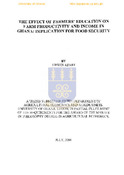UGSpace Repository
The Effect of Farmers’ Education on Farm Productivity and Income in Ghana: Implication for Food Security
JavaScript is disabled for your browser. Some features of this site may not work without it.
| dc.contributor.advisor | Sarpong, D.B. | |
| dc.contributor.author | Afari, E. | |
| dc.contributor.other | University of Ghana, College of Basic and Applied Sciences School of Agriculture, Department of Agricultural Economics and Agribusiness | |
| dc.date.accessioned | 2016-03-15T10:46:28Z | |
| dc.date.accessioned | 2017-10-13T16:04:46Z | |
| dc.date.available | 2016-03-15T10:46:28Z | |
| dc.date.available | 2017-10-13T16:04:46Z | |
| dc.date.issued | 2001-07 | |
| dc.identifier.uri | http://197.255.68.203/handle/123456789/7861 | |
| dc.description | Thesis (MPhil) - University of Ghana, 2001 | |
| dc.description.abstract | Low agricultural productivity has been identified as the major cause of food insecurity and food self-insufficiency in Ghana. Human capital improvement through farmer education (both formal and informal) is essential for increasing agricultural productivity and farm income of rural farmers. The study estimated and quantified the contribution of education and exposure to extension service contact to farm productivity and farm income. The findings show that the average schooling years of farmers sampled from the GLSS 4 survey data is just below the primary level. Weighted Least Squares estimates for cassava farm production function indicate that household heads’ education, as measured by years of formal schooling completed, had a positive but insignificant effect on farm productivity. We find similar results for maize farmers. Farm productivity increases ceteris paribus by 0.59 percent and 1.43 percent for cassava farmers with primary and secondary education respectively. Percentage increase in cassava output is as much as 3.7 for one (each) additional year of schooling above the mean educational level of sampled farmers. For maize farmers, at least middle school education was found to be necessary for significant benefits of schooling and returns to schooling are highest for farmers with middle and post secondary education in the farm income estimation. Maize output is likely to increase by 3.1 percent for one extra year of schooling at the mean educational level of the sampled farmers. Extension service contact was found not to significantly enhance productivity in any way for both cassava and maize farmers. The study recommends that higher levels of investment in basic and secondary education should be a priority for the government, with special attention going to smallholder staple crop farmers in the area of informal education to enable them improve on their efficiency on the farm. Increase in farm productivity through improved education would ultimately contribute to the attainment of food security in the country. | en_US |
| dc.format.extent | xi, 106p. :ill. | |
| dc.language.iso | en | en_US |
| dc.publisher | University of Ghana | en_US |
| dc.title | The Effect of Farmers’ Education on Farm Productivity and Income in Ghana: Implication for Food Security | en_US |
| dc.type | Thesis | en_US |
| dc.rights.holder | University of Ghana |
